John Lewis
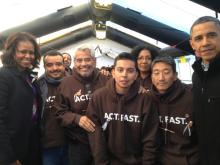
Sapped by three weeks of a water-only diet, three activists for immigration reform ended their fasts Tuesday with a morsel of bread blessed by a priest and “passed the fast on” to others who hope to keep attention focused on the issue.
“You have truly put your faith in action,” said retired Washington Archbishop Theodore McCarrick, one in a small crowd of political and clerical dignitaries who came to the National Mall to praise those who have gone without food in a bid to pressure Republican House leaders to pass an immigration reform bill.
Also seated alongside the quiet and wan fasters: House Minority Leader Nancy Pelosi; the Rev. Bernice King, the daughter of the Rev. Martin Luther King Jr.; Secretary of Labor Tom Perez; Rep. John Lewis, D-Ga.; and the Rev. Al Sharpton.
In recent weeks, the fasters have attracted high-profile visitors, including President Obama, first lady Michelle Obama, and Vice President Joe Biden, to the heated tents where the fasters have been living on the National Mall.
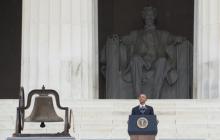
Editor's Note: The following is a transcript of President Barack Obama's speech from the Lincoln Memorial on the 50th Anniversary of the March on Washington.
We rightly and best remember Dr. King’s soaring oratory that day, how he gave mighty voice to the quiet hopes of millions; how he offered a salvation path for oppressed and oppressors alike. His words belong to the ages, possessing a power and prophecy unmatched in our time.
But we would do well to recall that day itself also belonged to those ordinary people whose names never appeared in the history books, never got on TV. Many had gone to segregated schools and sat at segregated lunch counters. They lived in towns where they couldn’t vote and cities where their votes didn’t matter. They were couples in love who couldn’t marry, soldiers who fought for freedom abroad that they found denied to them at home. They had seen loved ones beaten, and children fire-hosed, and they had every reason to lash out in anger, or resign themselves to a bitter fate.
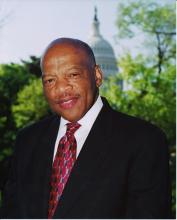
Don Cash had graduated from high school in June 1963 and decided on the spur of the moment to join the March on Washington when he finished his work shift at a nearby warehouse. The Baptist layman is the president of the United Food and Commercial Workers Union’s Minority Coalition and a board member of the Southern Christian Leadership Conference and the NAACP.
“I think we got a long ways to go but I do think that there’s been a lot of changes. I don’t think you’ll ever see what Martin Luther King dreamed in reality, in total. I think we’ll always have to strive for perfection. The dream that he had is a perfect world and I think that in order to be perfect, you have to continue to work at it.”
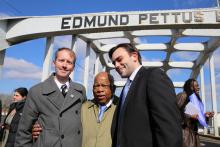
It may have taken a little bit of prodding — a little ‘you-want-me-to-do-what?’ and a lot of faith — but in the end, Congressman John Lewis agreed to go along with staffer Andrew Aydin’s out-of-the-box idea. The result: March (Book 1) — the first of a three-part graphic novel autobiography chronicling Lewis’ life and the Civil Rights Movement.
“The story of the movement that we tell is very much John Lewis’ story in this first book,” Aydin said. “It is a story of him growing up poor, on a farm, and it builds to a climax of the national sit-in movement.”
Lewis certainly has a lot to tell. He and other activists famously were beaten by police on the Edmund Pettus Bridge in Selma, Ala., in 1965 during an attempted march for voting rights — an event that became known as “Bloody Sunday.” He served as chairman of the Student Nonviolent Coordinating Committee during the height of the movement, spoke at the historic March on Washington alongside Dr. Martin Luther King, Jr., and was instrumental in the passage of the Voting Rights Act of 1965.
Aydin, who co-wrote the book with Congressman Lewis, and illustrator Nate Powell sat down with Sojourners to explain how the series came about and why it is such an important story these 50 years later.
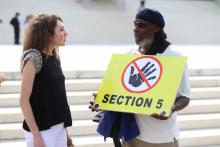
Today is a dark day in our nation’s history. In a 5-4 ruling, the Supreme Court ruled in the case of Shelby County, Alabama v. Holder that Section 4 of the Voting Rights Act is unconstitutional, rendering the 48-year-old legislation impotent to protect citizens from voter suppression. Section 4 lists the states that must obtain “preclearance” from the Department of Justice before instituting changes to their voter laws. In her dissenting opinion, Justice Ruth Bader Ginsburg, said: “Throwing out preclearance when it has worked and is continuing to work to stop discriminatory changes is like throwing away your umbrella in a rainstorm because you are not getting wet.”
Only 48 years ago, on March 7, 1965, men, women, and children absorbed blasts of water, bone-crushing blows from police batons, and profound humiliation as Selma, Ala., police dragged limp black bodies over concrete on the far side of the Edmund Pettus Bridge. They had assembled on that day, which came to be known as “Bloody Sunday,” to march from Selma to Montgomery in protest of voter suppression and intimidation that had plagued the entire South. Ten days later, President Lyndon B. Johnson sent the Voting Rights Act to Congress. The bill passed in the Senate on May 26 by a vote of 77 – 19 and passed in the House on July 9 of that year. President Johnson signed the Act into law with Dr. Martin Luther King, Rosa Parks, and others present on August 6.
Flash forward to Fall 2012. I launched a blog series called “Watch the Vote” because, as of August 2012, 30 states had introduced legislation or enacted laws to hinder voters’ access to voting over the previous year. The Fair Elections Legal Network crafted this map to chart the spread of legal voter suppression initiatives across the nation. Notice, Alabama is one of the states that has recently passed voter restriction law that has not been precleared by the Department of Justice. Its new law, requiring photo ID and proof of citizenship, was set to take effect in 2014 before the Supreme Court ruled last week that Arizona’s voter ID law, which Alabama used as a model for its own, is unconstitutional.
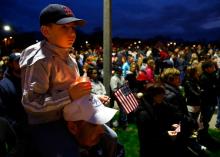
I hear it over and over again both during my conversations on the road, and as I skim the headlines each day, that we are in a battle for the common good.
I learned about the Boston bombings as my plane landed in Portland, Ore., traveling for an 18-city book tour to spark a conversation on “the common good.” As I read and watched more about the tragedy, there unfolded such a stark and brutal contrast between the explicit intent to kill, hurt, and maim others, and the actions of those who rushed toward the blast, risking their own lives to help the wounded. One act of vicious violence was aimed to destroy the common good and create a society based on fear. The others displayed the highest commitment to redeem the common good and insist that we will not become a nation based on fear, but on mutual service and support.
When real or imagined grievances combine with rage, religious fundamentalism, political extremism, mental illness, or emotional instability, we lose the common good to dangerous violence, fear, and deep distrust in the social environment. But when grievances lead to civil discourse, moral engagement, and even love and forgiveness, different outcomes are possible.
This past weekend, The Faith and Politics Institute led a three-day Congressional trip to visit Civil Rights landmarks across Alabama — from Tuscaloosa to Birmingham to Montgomery to Selma. It was an incredibly moving, emotionally exhausting, soul-quenching pilgrimage as we journeyed along with heroes of the Civil Rights movement and experienced their stories.
One such hero is Congressman John Lewis. A highlight of the trip for me is recorded at the jump.
This year marks a long list of anniversaries in our nation's long march for civil rights: We now mark 150 years since the Emancipation Proclamation; and 50 years since the Stand in the Schoolhouse Door, Martin Luther King, Jr.'s "Letter from Birmingham Jail," the March on Washington, the bombing at Sixteenth Street Baptist Church that killed four little girls, and the murder of Medgar Evers in his driveway.
In remembrance of the sacred journey, The Faith and Politics Institute's Civil Rights Pilgrimage drew more than 250 people, including 30 members of Congress, for a three-day tour of civil rights landmarks and first-hand testimonies from the movement's leaders. Throughout the pilgrimage — moving from Tuscaloosa to Birmingham to Montgomery to Selma — the delegation learned, grew, and continued the conversation together: white and black, Republican and Democrat, man and woman, senior and child. We all returned to Washington, D.C., and to our homes across the country, with a renewed sense of responsibility for the common good.
A number of events made the term 'reconciliation' mean more than the definition I had somehow created for myself over the past 30 years. Reconciliation is calling the person who beat and humiliated you 'brother.' Reconciliation is sharing a platform, sharing a deeply intertwined story — and sharing an authentic embrace — with the offspring of your parents' enemies.
[Photo Gallery at the jump.]
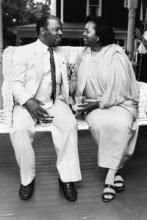
Amidst the jubilation of the new year and a long awaited solution to the fiscal cliff crisis lies sad news: Lillian Miles Lewis, the wife of U.S. Rep. John Lewis, died Monday morning in Atlanta, his office announced. Spokeswoman Brenda Jones said John Lewis is returning to Atlanta but had no more details to release about the cause of death.
The Lewises had been married 44 years. They have one son, John Miles.
On March 7, 1965, 600 civil rights marchers attempted to walk from Selma to Montgomery, Alabama, in support of equal voting rights for blacks and whites.
Over the past few days, I've had the privilege of representing Sojourners magazine at the annual Faith and Politics civil rights pilgrimage led by Congressman John Lewis.
Forty-six years ago, on Aug. 28, the Rev. Dr. Martin Luther King Jr. stood and gave the "I Have a Dream" speech [full video below]. And even this sentence reveals one of the fundamental struggles that continues in our nation.